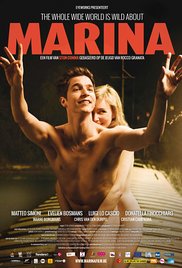
MARINA
Belgium, 2013, 113 minutes, Colour.
Luigi Lo Cascio, Donatella Finocchiari, Matteo Simoni, Evelien Bosmans, Flor Decleir.
Directed by Stijn Coninx.
Amongst the films by Belgian director Stijn Coninx are his portrait of a social-minded priest in the 1890s, Daens, and a serious look at the singer who was best known as Soeur Sourire/ Sister Smile with her song in the 1960s, Dominique. He has gone back into Belgium’s past with this story of Rocco Granata, a young accordion player, a singer who achieved international fame – and his keynote song, Marina.
The film offers a picture of Flemish society after World War II, the coal mines of the Limburg region and the importation of Italian workers for the mines. Salvatore Granata is one of a group of miners in 1948 who go to Belgium for a couple of years, leaving wives alone, caring for their children. However, Granata sends for his family and they are able to migrate – difficult in terms of language for the mother, easier for the children who, though seen as foreigners, begin to learn the language and become Belgians.
The father is strict, not wanting his son to become a miner but have his own forge. However, he is talented with the accordion and likes to sing, eventually winning the competition and some money, to the upset of his father. With tension in the household, Rocco tries to please his father. The father has an accident in the mine, gets limited financial compensation. It seems that the family will have to move out of its home. Rocco sells his accordion to get some money for rent.
He and his friends play in a local club and produce a record though the producer says it will have no life. On the contrary, it becomes popular, even being sold by the grocer who has been hostile to the family and not allowing his daughter to mix with the Italians. The daughter has always been attracted to Rocco and there is an incident on a bridge where Rocco saves the girl who is later raped by her boyfriend.
The end of the film has Rocco in Carnegie Hall, his performance in 1958 being broadcast and his father, eventually proud, takes the radio out of the house into the street so that everybody can listen to his son.
Actor Matteo Simoni portrays Rocco, being a Belgian of Italian origin.
1. An international story? European story? Italy? Belgium?
2. Post-war Italy? The devastation? Work, poverty, the mines, forges, the times, migration? Belgium and the mines and the needs? The workers, travel, accommodation? Prejudices for and against? The parent generation? The younger generation?
3. The period, the look, costumes and decor, in Italy, Italians and their traditions, food, patriarchal, language? The contrast with Belgium, orderly, homes, the mines, working conditions, shops, language?
4. The title, the popularity of the song, Rocco’s story and life, the hard life, his success, career? From Italy to Belgium to international star?
5. The range of the songs, the musical score? Performance? Piano accordions? Bands? Recordings?
6. Italy, 1948, the family, the father and his work in the mine, the decision to go to Belgium, the prospect of many years? The wives, at home, alone, the children? Hardships? The mentality?
7. Belgium as a foreign country, the mines, the work, the bosses, accommodation, hard, cash, the letters home? The father offering hope and the family migrating?
8. The sense of migration, the father, subservient, obedient, continuing his work, his expectations? His wife and obeying, homesick? The son and daughter, at home in Belgium, yet feeling foreign, at school, learning the language? Beginning to belong?
9. Rocco’s story, as a young boy, in Italy, devotion to his father? In Belgium, active, his music, playing the accordion? The encounters with Jackie? His friends? The shop, Helene? His mother and thrift? His mother’s later visited the shop, buying the chicory? The father, the company? His anger at his son, wanting him to have a forge, not a musician? The issue of the accordion, buying it, Rocco’s performance and the accordion left in the rain? The father’s response to Rocco’s success, going to the club, the competition, his walking out, his anger? Rocco and his talent, the competition, winning, trying to please his father? His reaction to the accordion out in the rain?
10. Helene, as a girl, the father, the shop, his bigotry, her growing up, attractive, meeting Rocco, the bond between them, going to the clubs to listen to him? Rocco’s mother the shop, the chicory, the language? His forbidding Helene to meet with Rocco?
11. The meetings, the club, Helene going to study, her boyfriend, going to the club, his angrily walking out? On the bridge – and Rocco seeing her, the possibility of her jumping? The couple on the bridge, the sexual encounter? The aftermath? The boyfriend and the rape, the effect on Helene?
12. The father, his accident, the issue of money, the rent, insurance, compensation, having to move out of the house? Rocco selling his accordion, giving the money to his mother? The heartlessness of the local bosses?
13. The role of Jackie, slow, in the background, friendship with Rocco, the encounters? At the club? his observing? going to the police, the witness to the rape?
14. Rocco, the entrepreneur, the recording and the excitement, not being able to sell it, the distribution town, the grocer and his selling copies, the other sales? Rocco becoming a success?
15. The aftermath, playing Carnegie Hall, the long dedication of the performance to his father? The family listening to it in the kitchen? His father taking the radio out so that everybody could hear?
16. A pleasing biography of a Belgian celebrity?